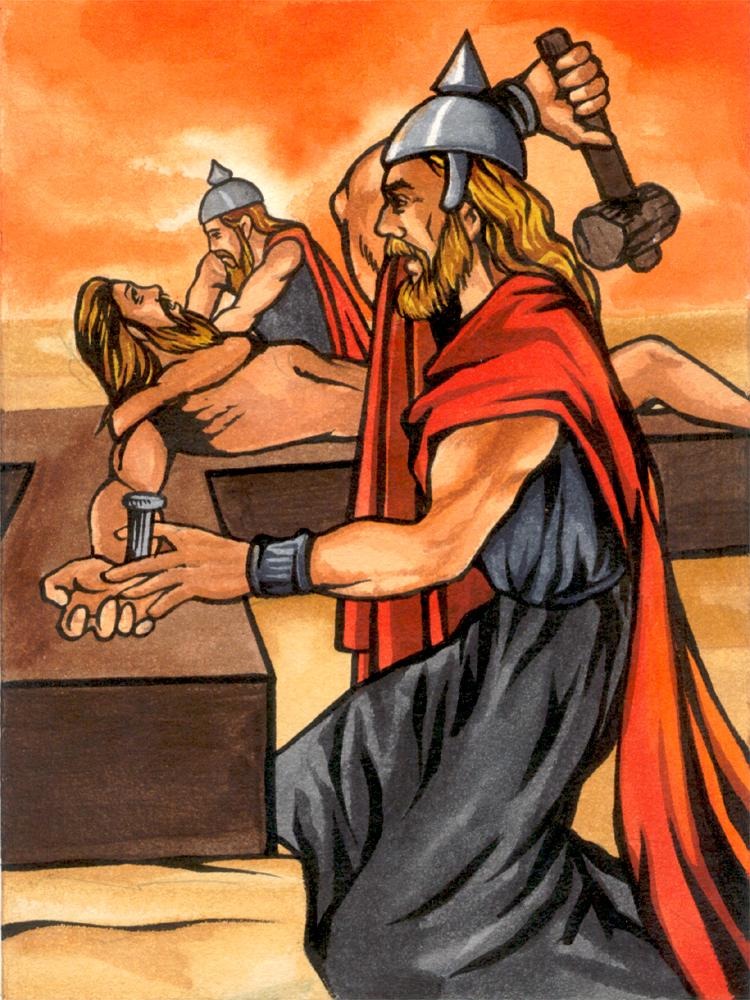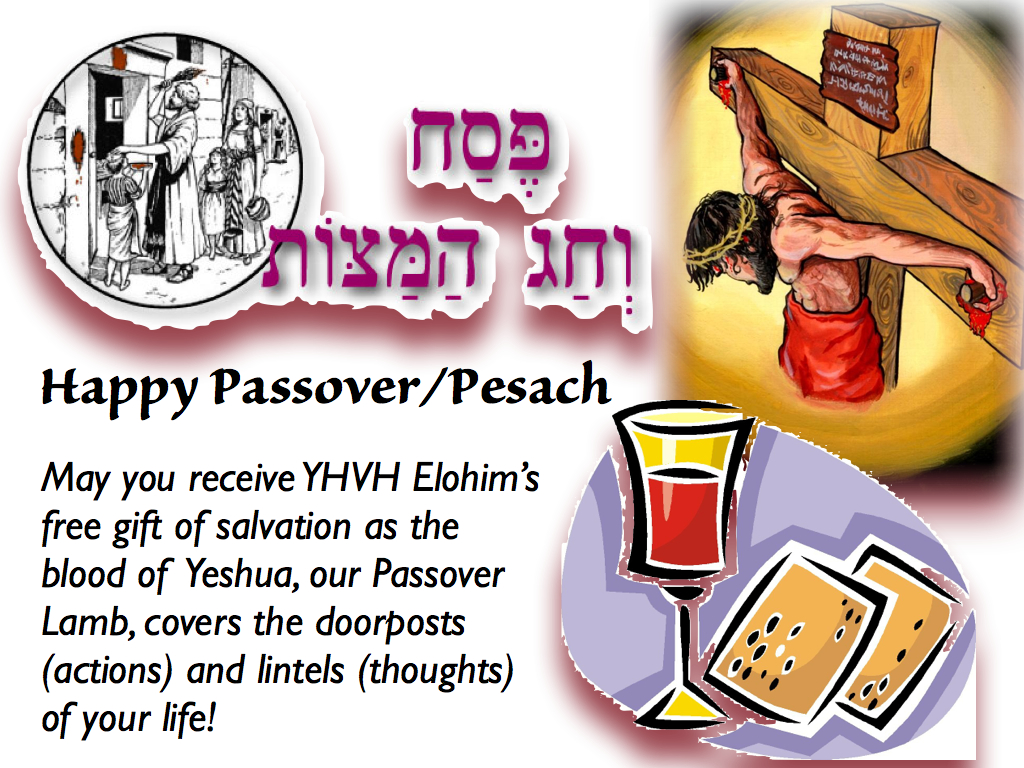Tag Archives: Passover
How the First Passover Perfectly Pictured Yeshua the Messiah
For I am not ashamed of the gospel of Messiah, for it is the power of Elohim to salvation for everyone who believes, for the Jew first and also for the Greek. (Rom 1:16)
For the preaching of the cross is to them that perish foolishness; but unto us which are saved it is the power of God. (1 Cor 1:18)
Neither is there salvation in any other: for there is none other name under heaven given among men, whereby we must be saved [except the name of Yeshua the Messiah]. (Acts 4:12)
According to the laws of statistical probability, what are the chances of an event happening and then fifteen hundred years later another event occurring bearing an uncanny resemblance to the first one? Now suppose that not only did fifteen hundred years separate the two events, but that they occurred in two different countries several hundred miles apart, which in the ancient world considering the difficulties of travel and communications may as well have been halfway around the globe. Now suppose that the second event involved the death of a person, and that the events leading up to their death including the manner and timing of that death was beyond the control of the individual dying so that in no way could the person dying stage his death to mirror the first event. In fact, those killing the individual possessed no foreknowledge of the event that had occurred fifteen hundred years earlier. What are the chances of this occurring? Well beyond the laws of possibility!
This is not a fictional story! Truth is sometimes stranger than fiction. The details of these two events are chronicled in the pages of the Bible. The first event occurred in ancient Egypt and is recorded in the Book of Exodus chapters eleven and twelve. There we find recorded the details of the children of Israel’s first Passover while they were yet slaves in the land of Egypt. A whole series of events led up to this first Passover, which culminated with each family’s ritual killing of a lamb, smearing its blood on the frame of their doors, roasting the lamb, and then eating it. Doing this insured that YHVH would pass over their homes leaving those inside alive. The firstborn of those whose homes did not have the blood on them were killed.
The second event involved a descendant of those ancient people who was born in a different land fifteen hundred years later. His name was Yeshua of Nazareth, a Jew, and viewed by many of his day as the long-awaited Messiah of Israel. One of Continue reading
Happy Passover 2016!
Why Celebrate the Passover?
Isn’t your life already busy enough? Who has time for a six-hour Passover Seder commemorating something that happened thousands of years ago? What could this possibly have to do with my life here and now, you may ask? How can a 3500-year-old Biblical ritual in any way relate to those living in the age of the laser, satellites, the worldwide web and computers? Well, let’s see!
The Preacher said in Ecclesiastes 3:15, “That which is has been already and that which will be has already been.…” Life is full of paradoxes. Do advancements in technology, science, economics, medicine, religion, and world government really promise to give men the rest for their weary souls for which they long?
How about a different approach to the questions and problems facing modern man? Is it possible to go forward by going backwards? This is a thesis that the ancient prophet Yermeyahu (Jeremiah) proffered to those who had ears to hear. He said, “Thus says YHVH, ‘Stand by the ways and see and ask for the ancient paths, where the good way is, and walk in it; and you will find rest for your souls. But they said, we will not walk in it’” (Jer 6:16). What were those ancient paths to which this white-haired Jewish prophet referred? Continue reading
New Video: Preparing Yourself For Passover
Passover and Feast of Unleavened Bread Teaching Resources
Here are some free resources that will help you to celebrate the upcoming biblical feasts with meaning and purpose according to the Scriptures:
Biblical calendar printouts so you know the dates of the biblical feasts: http://www.hoshanarabbah.org/calendars.html
Teaching articles on the biblical feasts: http://www.hoshanarabbah.org/teaching.html#feast
Teaching videos on the biblical feasts: https://www.youtube.com/user/HoshanaRabbah
Passover and Feast of Unleavened Bread Resources: http://www.hoshanarabbah.org/pesach.html
Passover haggadah so you can know how to do your ownPassover seder: http://www.hoshanarabbah.org/pdfs/haggadah09_2up.pdf
All these resources and much more can be found at our main website: http://www.hoshanarabbah.org
Preparing Ourselves Spiritually for Passover
Passover and the Feast of Unleavened occur next weekend. Passover falls on the night of Saturday, April 23 on the biblical calendar, and the first high sabbath day of the Feast of Unleavened Bread falls on Sunday, April 24. The last day of Unleavened Bread falls on Saturday, April 30 and is also a high sabbath day. It is time to make physical and spiritual preparations for these special, commanded events on YHVH’s calendar. The following is a list that will help you to do this.
Repent of Sin and Get Under the Lamb’s Blood. As the children of Israel applied the lamb’s blood to the door posts and lintels of their house, so we must apply the sin-cleansing and Satan-defeating blood of Yeshua afresh to our lives (i.e., to your thoughts as represented by the door lintel and actions and to our hands as represented by the door posts). This occurs as we repent of our sins, and pray for and receive YHVH’s forgiveness. He will then cover our sins over or wash away our sins by Yeshua’s blood (1 John 1:9; Rev 1:5)
In Egypt at Passover time, YHVH judged all those who had failed to put the lamb’s blood on the door posts of there houses. In other words, they weren’t under the blood of the lamb, and they were still under the penalty of sin, which is death. Unrepented sin has a death claim on us all. To the degree that one has sin in their life is the degree that the spirit of death has a hold on one’s life. Now is the time to repent of sin by confessing it and seeking Elohim’s forgiveness under the blood of Yeshua.
Here are some things of which to repent.
- Pride. Do you always think that you’re right? Your opinion is what matters the most? Do you have a hard time with those who don’t see it your way, when you don’t get your way? Do you have a fit when people disagree with you? Do you criticize others and put others down (especially those who are closest to you)? Do you belittle, mock, scorn and ridicule others? Do you focus on people’s faults? Do you have a hard time identifying any sins that you have committed? Are you proud of your humility? Are you proud of how Torah-observant you are (compared to others)? Are we overly defensive when someone corrects us or challenges our opinion? Do we blame others when things don’t go right instead of taking personal responsibility for our actions? These are all signs of pride. Pride is self-idolization.
- Selfishness and self-absorption (putting self above others too much of the time). Are you ungrateful? Are you discontent about your place in life? Do you always want more? Are your material possessions and personal belongings really important to you? Do you have a hard time giving things away? This is a form of self-idolatry and idolization of things.
- Love of this world over love of YHVH and the things that matter to him. This a form of idolatry. You’re concerned with what others think more than what Elohim thinks about things.
- Sins of the mouth including mean, selfish, unkind, angry, impatient, egotistical words toward others. This is idolization of self. What matters most is what I have to say, how I feel, my opinions and I have the right to say what I want when I want.
- The lack of the fear of Elohim. More concerned with what others think than what YHVH Elohim thinks about something. Anything in our lives that puts anything else above Elohim is idolatry.
- Ask yourself this: In everything that I do and say, am I advancing the kingdom of Elohim and bringing glory to Yeshua or am I doing the opposite? Am I being a river of life to all those around me, or am I dragging them downward by bringing negativity and darkness?
Tell the Redemption Story. It is the responsibility of parents and elders to pass on to the next generation the Passover story (Exod 12:24–27). Explain how the Israelites were enslaved in Egypt (a metaphor for the world) to Pharaoh (a metaphor for Satan), and how YHVH delivered them from the judgment of the destroyer (YHVH’s judgment against sin) because the children of Israel put the blood of the lamb on their doorposts (a picture of Yeshua’s sin-atoning death on the cross). In reality, this is the basic gospel message.
Celebrate the Feasts. Prepare your heart and mind to obey YHVH by keeping his appointed times of Passover and Unleavened Bread. Are we willing to obey his commands pertaining to these observances? How much do we love him (John 14:15)? How much do we want to know him (1 John 2:6–7)? Celebrating these feasts help us to love him and to know him better.
Examine Yourself. At this time of the year, we must each examine ourselves to insure that we will not be partaking of the cup of redemption (i.e. the communion cup) unworthily (1 Cor 11:28).
Rediscover the Cross. It is time to rediscover the cross of Yeshua again and your place at its foot. It is also time to rediscover the power of the resurrected Yeshua in one’s life. Marvel at the miracle of the resurrection and consider the fact that we have access to Yeshua’s resurrected life through faith in him and through the work of his Set-Apart Spirit as we obey the Word of Elohim.
A Time of Spiritual Awakening and New Beginnings. Passover occurs in the spring at the beginning of the biblical year. Spring is a time of new physical and spiritual new beginnings. Spiritually, it’s the time to take stock of one’s life, assess any weaknesses and deficiencies we have, and then resolve to make the necessary changes. It is the time to make improvements through the power of YHVH’s grace, his Word, his Spirit all through a vibrant, daily relationship with Yeshua our Lord and Savior.
The Season for Spiritual Housecleaning. Passover is time of spring cleaning and deleavening our physical houses (Exod 12:15–20) and removing the leaven of sin from our spiritual houses as well (Pss 26:2; 139:1, 23–24). We must root out and eradicate the old sin habits from the crevices and dark areas of our life. In Scripture, leavening represents sin, pride, hypocrisy and false doctrine. It’s time to forsake all these things that drag us down spiritually and pull us away from our Father in heaven. It’s time to move onward and upward spiritually!
Time to Deleaven. In the Scriptures, leaven is a metaphor for sin. This is the time of year to deleaven our lives. Do the sinful practices, evil habits and illicit delicacies of Egypt still hold sway on us? Do any unclean spirits or filthy habits still have control over us? It is time to take control of these sins and eliminate them and become wholly consecrated unto YHVH-Yeshua, his Word, his plans and purposes. It is time to seek first his kingdom and his righteousness (Matt 6:33). One can’t serve two masters at the same time (i.e., the world and the flesh) and expect to be pleasing to YHVH (Matt 6:24).
Time to Renew Our First Love For Yeshua. It is time to renew one’s first love for Yeshua our Heavenly Bridegroom (Rev 2:4–5). Now is the time to rekindle one’s passion and zeal for Yeshua and to repent of spiritual lukewarmness (Rev 3:15–21).





